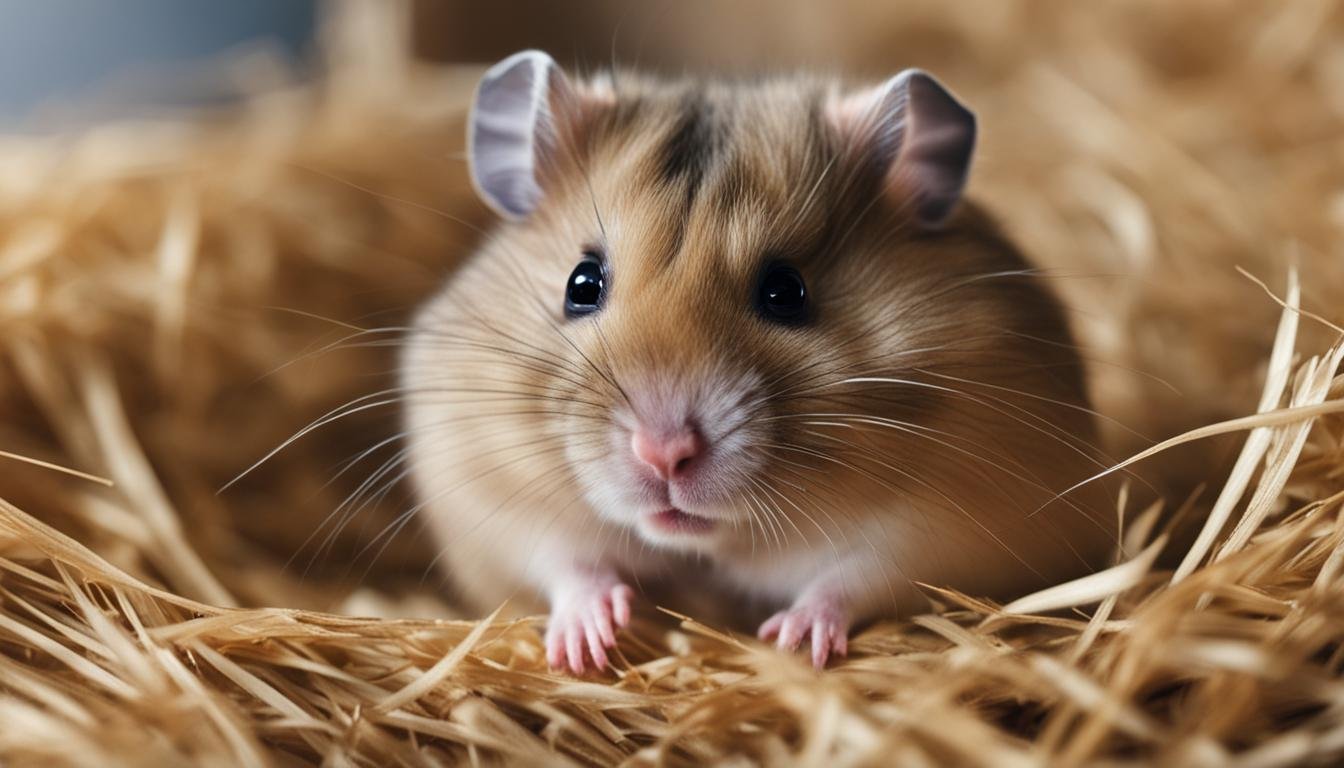Hair loss in hamsters, also known as alopecia, can be a cause for concern among pet owners. Understanding the reasons for hamster hair loss is important in order to take appropriate action and ensure the well-being of your furry friend.
There can be several causes behind hair loss in hamsters. Common factors include age-related issues, environmental trauma, nutritional deficiencies, ectoparasites, thyroid problems, organ diseases, and cancers. It is essential to identify the underlying cause to determine the best course of action for treatment and management.
In order to diagnose the cause of hair loss, a veterinarian will conduct a thorough examination and may perform tests such as skin scrapes, tape prep, blood tests, or specialized tests for conditions like ringworm. Understanding the exact cause will help determine the appropriate treatment.
Treatment options for hamster hair loss vary depending on the underlying cause. These may include stress reduction techniques, dietary adjustments, medication, or palliative care for certain cancers. Regular cleaning of the cage and maintaining a clean environment are essential for recovery and prevention of further hair loss.
If your hamster is experiencing hair loss, it is important to consult with a veterinarian for an accurate diagnosis and to discuss the most appropriate treatment plan. Early intervention and proper care are key to helping your hamster recover from hair loss and prevent future issues.
Symptoms and Diagnosis of Hair Loss in Hamsters
When it comes to hair loss in hamsters, identifying the signs of alopecia is crucial in determining the underlying cause. Keep an eye out for the following symptoms:
- Thinning hair
- Patches of hair loss
- Scabbing
- Dandruff
- Lethargy
These symptoms may indicate various factors contributing to the hair loss. To diagnose the exact cause, veterinarians rely on a thorough examination and diagnostic tests. When examining a hamster, the veterinarian will take into account the pattern of hair loss, the presence of other symptoms such as redness or pain, and the location of the hair loss.
Diagnostic tests may include:
- Skin scrapes
- Tape prep
- Blood tests
These tests help identify potential ectoparasites, nutritional imbalances, thyroid issues, organ diseases, infections, or cancers that may be contributing to the hair loss in hamsters.
Note: Image for illustrative purposes only. Not an actual representation of hair loss in hamsters.
Treatment and Management of Hair Loss in Hamsters
When it comes to treating and managing hair loss in hamsters, the approach depends on the underlying cause determined by a veterinarian. It’s crucial to address the root cause to ensure effective recovery and future prevention of hair loss.
For hamsters experiencing stress-related hair loss, controlling stressors and limiting contact with cage mates can often lead to improvement. Additionally, creating a calm and comfortable environment for the hamster can significantly reduce hair loss caused by stress.
In cases where hair loss is due to environmental trauma, such as habitat disturbances or harsh living conditions, making appropriate adjustments to the hamster’s habitat is essential. Providing a safe and enriching environment can positively impact the hamster’s well-being and aid in hair regrowth.
Dietary adjustments play a crucial role in addressing hair loss caused by nutritional deficiencies. Ensuring the hamster receives a balanced and nutritious diet, specific to their needs, can promote healthy hair growth. Consult with a veterinarian for guidance on the best diet for your hamster.
Ectoparasite infections, such as mites or fleas, are common culprits of hair loss in hamsters. These infections can be treated with oral or topical medications prescribed by a veterinarian. Regular cleaning of the cage and thorough grooming of the hamster can help prevent reinfestation.
In instances where low thyroid levels contribute to hair loss, thyroid supplementation medication may be prescribed to support proper hormone levels. Close monitoring of the hamster’s overall health is necessary to ensure the treatment is effective.
In unfortunate cases where hair loss is caused by organ diseases, a comprehensive diagnostic workup is essential to determine the appropriate treatment plan. The veterinarian will assess the hamster’s organ functions and recommend suitable therapies accordingly.
It is important to note that there is no specific cure for hair loss caused by cancers in hamsters. However, palliative care can be provided to improve the hamster’s quality of life. Regular monitoring and consultation with a veterinarian are crucial to ensure the hamster’s comfort.
Proper hygiene and cleanliness of the cage are vital for the recovery and prevention of further hair loss in hamsters. Regular cleaning, disinfection, and removal of any potential irritants or allergens can promote healthy hair growth and overall well-being.

| Treatment | Underlying Causes |
|---|---|
| Stress Reduction | Stress-related hair loss |
| Habitat Adjustments | Environmental trauma |
| Dietary Adjustments | Nutritional deficiencies |
| Topical or Oral Medications | Ectoparasite infections |
| Thyroid Supplementation Medication | Low thyroid levels |
| Comprehensive Diagnostic Workup | Organ diseases |
| Palliative Care | Cancers causing hair loss |
Prevention of Hair Loss in Hamsters
To ensure that your hamster maintains a healthy coat of fur, it is important to implement effective prevention strategies. By following these tips, you can help prevent hair loss in your furry friend and promote their overall well-being.
Maintain a Clean and Hygienic Cage
Regular cleaning and disinfection of your hamster’s cage play a crucial role in preventing hair loss. A clean environment reduces the risk of infestations by ectoparasites such as mites or fleas, which can cause hair loss. Aim to clean the cage at least once a week, removing any waste, uneaten food, and soiled bedding. Use a pet-safe cleaning product to disinfect the cage, ensuring that all surfaces are thoroughly cleaned and rinsed before reintroducing your hamster.
Avoid Exposure to Other Hamsters or Rodents
Minimize the risk of contagious causes of hair loss by avoiding direct contact between your hamster and other hamsters or rodents. Hair loss can be a result of injury or aggressive grooming by cage mates. Keeping your hamster in a separate enclosure will help reduce the likelihood of these incidents and contribute to a healthy coat.
Provide a Balanced and Nutritious Diet
A well-rounded and nutritionally balanced diet is essential for preventing hair loss due to nutritional deficiencies. Ensure that your hamster’s diet consists of high-quality commercial hamster food supplemented with fresh vegetables, fruits, and occasional protein-rich treats like mealworms. Consult with a veterinarian to determine the specific dietary needs of your hamster.
Regular Check-ups with a Veterinarian
Regular veterinary check-ups are vital for identifying and addressing any potential health issues before they lead to hair loss. A veterinarian can perform a thorough examination, provide guidance on proper care, and recommend any necessary treatments or dietary adjustments. Early intervention is key to preventing and managing hair loss in hamsters.
Recovering From Hair Loss in Hamsters: FAQs
Bald patches in hamsters can be a cause of concern for their owners. However, with the right treatment and care, most bald patches have the potential to regrow. It’s important to understand that regrowth of hair in hamsters might take time and vary depending on individual factors.
After receiving appropriate treatment, bald patches in hamsters typically start regrowing hair within 4-6 weeks. However, in some cases, it may take longer, especially if there are underlying health conditions affecting hair regrowth.
While most bald patches can eventually grow back, it’s essential to note that there are instances where permanent hair loss may occur. The outcome depends on the cause of the hair loss and the effectiveness of the treatment provided. In any case of hair loss in hamsters, it’s crucial to consult a veterinarian to receive an accurate diagnosis and appropriate treatment.
